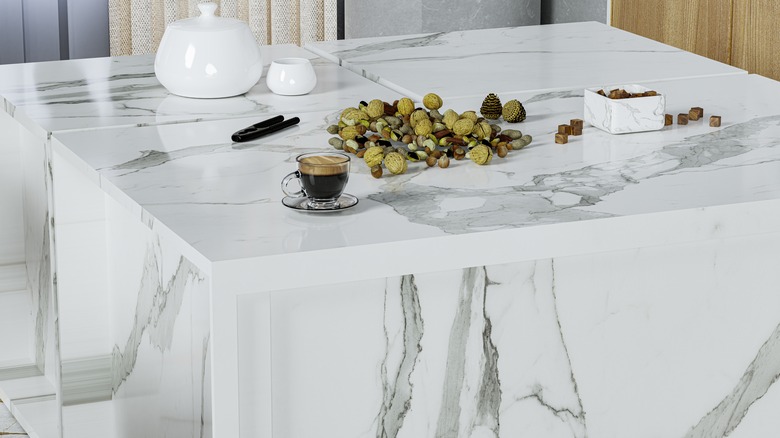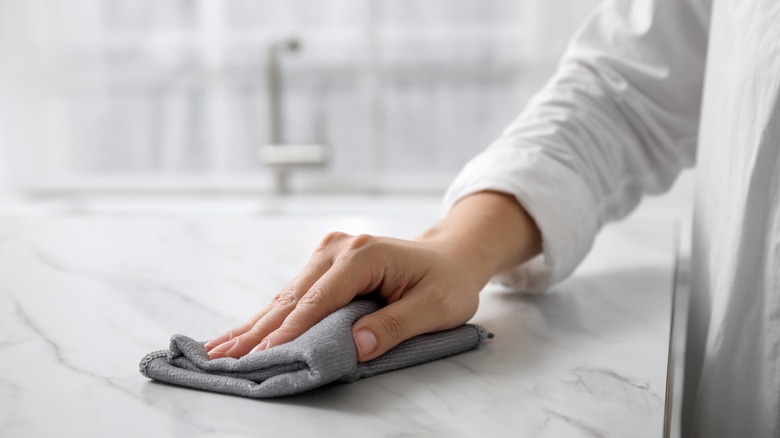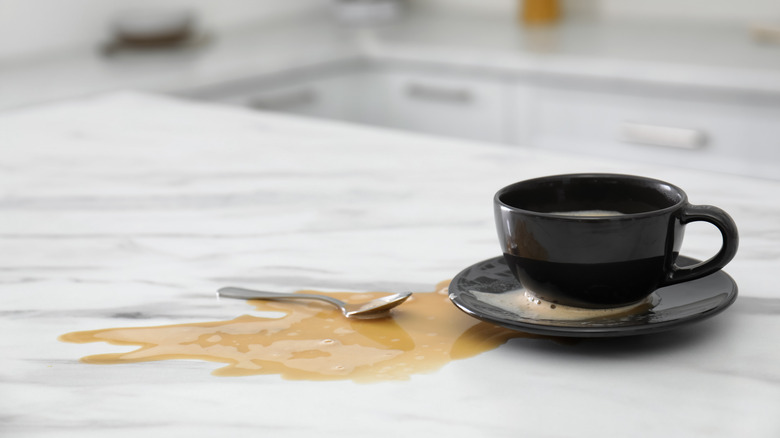Tips For Keeping Sintered Stone Countertops In Excellent Shape
Sintered stone countertops have been making waves in the design world as a greener alternative to quartz. Quartz has long been heralded as a more practical option to marble since it's heat, stain, and scratch resistant. It's a better choice for folks who don't want to be precious in their kitchens since you don't need to fret over spilling wine or splattering pasta sauce while cooking. However, there is a downside to the hardy material that sintered stone solves. Since quartz is manmade, it is fabricated with silica, which has since been classified as a carcinogen by the Occupational Safety and Health Administration. Sintered stone looks the same and has all the benefits of quartz, but it's made with less silica, making it a greener and safer countertop choice. But while it's a durable countertop material, that doesn't mean it doesn't require any upkeep — the stone still needs some routine TLC.
While sintered stone doesn't need sealer like marble or granite, it still needs to be cleaned periodically. Since it's used in high-traffic areas like kitchens and bathrooms, giving it a weekly scrub-down is important. But when doing so, you want to make sure you don't use abrasive cleaning tools or corrosive cleaning sprays. Here is how to maintain your sintered stone to keep it looking brand new.
How to clean sintered stone
Even though sintered stone is stain and scratch-resistant, it still needs routine maintenance to stay in good shape. When it comes to your weekly cleaning routine, it's best to use a pH-neutral soap and a soft sponge or microfiber cloth. While the material doesn't scratch easily, that doesn't mean it's bulletproof, so it's best to avoid any hard-bristle brushes, rough scouring pads, or metal brushes that can leave behind marks or grooves. The same reasoning goes for the pH-neutral soap. Such a cleaner is neither acidic nor basic, making it a gentle and safe choice for all your surfaces, ensuring you don't accidentally mark the stone. You also want to steer clear of very harsh cleaners, such as bleach or ammonia, as they can potentially damage the finish of the counter and leave dull spots where they burn the stone.
If you want to use a cleaning agent heartier than soap, just make sure that it isn't acidic and doesn't contain any waxes or oil soaps. While you might think that a waxy cleaning product will leave a shiny, protective film on top, the stone is non-porous, so it doesn't need a protective sealant. Using a product with such waxes can leave behind an oily residue that is very difficult to remove after the fact, so be sure to read your cleaning product's ingredient list before using it on the slab.
Avoid spills and extreme heat
While sintered stone is much more durable than marble or granite since it's non-porous, that doesn't mean that it will never become ruined. In order to keep it in tip-top shape, immediately clean up spills and avoid putting extremely hot dishes on its surfaces. Just remember that while sintered stone is resistant to staining, that doesn't mean it's stain-proof. This is especially true for acidic spills such as tea, coffee, or wine. Any of these can leave a mark if they're not wiped away relatively quickly.
As for heat, avoid creating extreme temperature changes on the stone. While it might withstand the occasional hot casserole dish on its surface, it's not guaranteed to withstand continual heat application. If you want to avoid burning or cracking its surface, use a trivet underneath any dishes or pots that have come off the stovetop or out of the oven. The same idea applies to scratches or chips. While sintered stone is much more scratch-resistant than natural stone, it's not completely scratch-proof. Avoid cutting food directly on the slab and refrain from dragging heavy objects across its surface. Following these simple maintenance rules will help keep your counters and tiles looking pristine for years to come.


